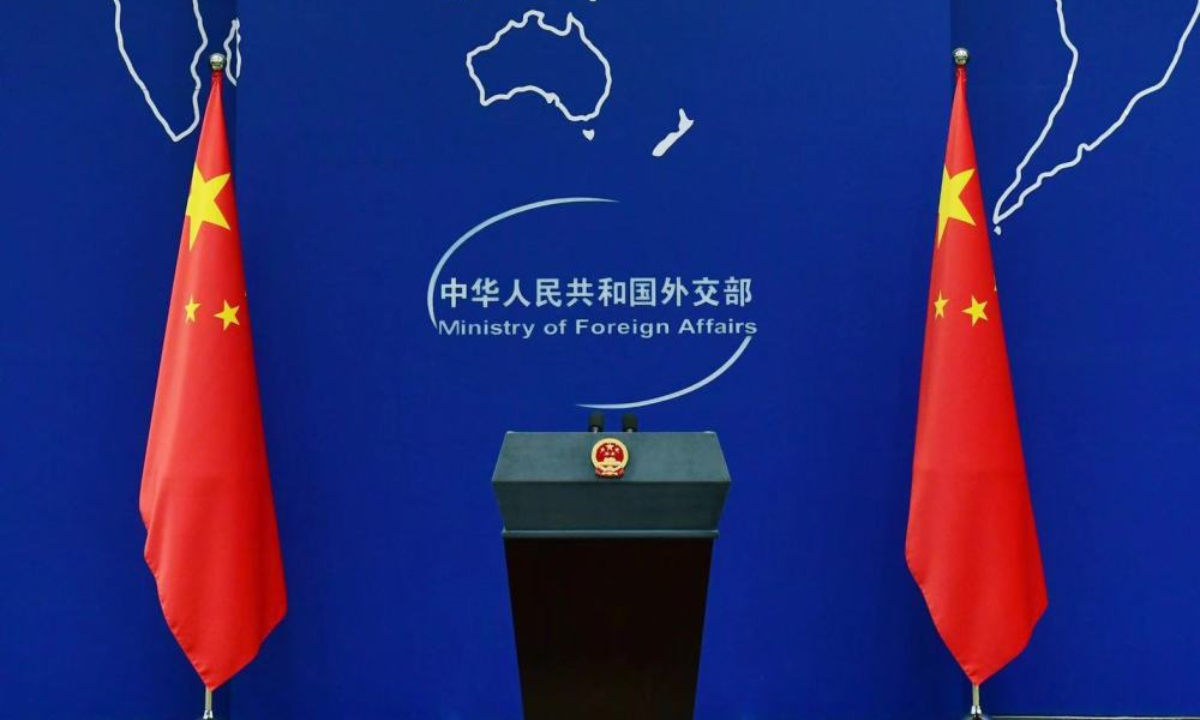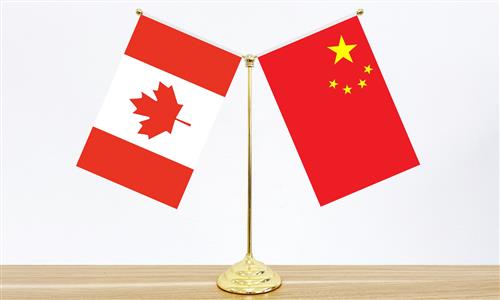Chinese FM blasts Canada for sanctions against Chinese personnel over ‘human rights’ allegations
Tough China stance to woo US, covering up previous mistakes with new one: experts

Photo: Chinese Foreign Ministry
Chinese Foreign Ministry on Wednesday expressed firm opposition and strong condemnation over Canada's recent sanctions against some Chinese personnel for alleged human rights violations, noting Canada is in no position to lecture others on human rights and point fingers at others' human rights situation.Chinese experts reached by the Global Times said that Justin Trudeau administration's latest gross move, in addition to a recent series of inconsiderate actions, shows that his administration is trying to demonstrate loyalty to the US by hyping Washington's political lies against China, and is attempting to take a tough stance toward Beijing to distract attention from domestic woes. However, Ottawa's actions are unwise and irresponsible as it will damage China-Canada relations and common interests, they noted.
Firm opposition
In a statement released Tuesday local time, Canadian Foreign Minister Melanie Joly announced sanctions against eight former or current Chinese officials involved in what the statement claimed as "grave human rights violations in the country," including Xinjiang and Xizang.
In response, Chinese Foreign Ministry spokesperson Mao Ning said at a press briefing Wednesday that without any factual basis, the Canadian government made false allegations against China in the name of human rights and imposed illicit sanctions on Chinese personnel.
Mao stated that China has achieved enormous progress in human rights and made important contribution to the world's human rights cause. This is a simple fact that no one without bias can deny.
Canada faces its own list of human rights issues. Its own human rights record has not been spotless. Even today, Canada's indigenous people still face systemic racial discrimination and unfair treatment. Instead of dealing with it, Canada chooses to smear and vilify other countries and spread lies about China's alleged human rights issues, Mao added, while urging Canada to reflect on itself, stop its poor political stunt and immediately lift its unlawful sanctions against relevant Chinese personnel.
Earlier on Tuesday, a spokesperson for the Chinese Embassy in Canada said in a statement that in recent years, nearly 100 countries have consistently supported China's just position on issues related to its Xinjiang and Xizang regions through joint statements, individual statements and other forms at the UN Human Rights Council, clearly speaking to what the international community truly aspire for.
Li Haidong, a professor at China Foreign Affairs University, said Ottawa is trying to show its loyalty to the outgoing Biden administration, as well as wooing the incoming new administration.
Using political lies fabricated by the US to provoke China shows that Ottawa believes the new US administration will inherit the policy legacy of the current White House and Ottawa is willing to cooperate with the US policy elite in the established comprehensive competition against China, Li said.
Lü Xiang, a research fellow at the Chinese Academy of Social Sciences, believes that while some US allies, including the UK, Japan and Australia are seeking to repair relations and cooperation with China after years of cold relations, Canada's approach is short-sighted.
For Lü, the Canadian approach is one of constantly covering up previous mistakes with new ones.
China-Canada relations hit a low when Canadian authorities arrested Huawei executive Meng Wanzhou in Vancouver 2018.
In July this year, Canadian Foreign Minister Joly visited China and met with China's Foreign Minister Wang Yi. The two officials met again in Lima, Peru in November.
Li said that although China and Canada share common interests in development, Canada's latest moves will undoubtedly bring uncertainties to the bilateral ties.
Unwise and irresponsible
In addition to rigid relations with China, the Trudeau administration is in a tense or weird situation with some other countries, as well as facing a drop in approval rating.
In October, India and Canada each expelled six diplomats in tit-for-tat moves as the row over last year's assassination of a Sikh separatist on Canadian soil intensifies.
Earlier this week, US President-elect Donald Trump mocked Canada's Justin Trudeau as the "governor" of a state, rather than as prime minister of Canada, over tariff and trade talks, according to NBC News.
In a poll released by Canadian media Global and Mail in November, more than half of Canadians believe that someone other than Trudeau should head the Liberals in the next election which has to be held no later than October 2025.
The Trudeau administration is trying to gain some marginal political benefits by taking a tough stance against China, but this move is very unwise and irresponsible, as it is not only unlikely to boost Trudeau's dismal approval rating, but would further damage China-Canada relations, Lü said.
In terms of foreign policy, Canada seems to lack autonomy and independent judgment, blindly following in Washington's steps, which is indeed pathetic, Li said.
Despite the current tensions between China and Canada, from the practical needs of Canada, strengthening economic and trade relations with China is still crucial to its economy, Lü said.
In his meeting with Canadian Trade Minister Mary Ng in Lima in November, Chinese Commerce Minister Wang Wentao said economic and trade cooperation has been a major driver of bilateral relations, while calling for joint efforts to manage and resolve trade disputes, which will serve the fundamental interests of both countries.
China believes that a sound bilateral relationship is ultimately beneficial to both countries, and will not bring China-Canada relations to an irreversible state due to Ottawa's temporary political impulse, Lü stated, "However, Canada should not abuse China's good will to create frictions and contradictions without a bottom line."


